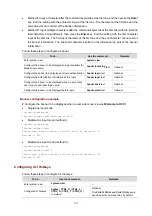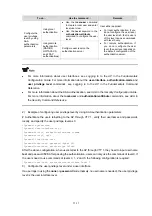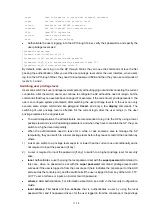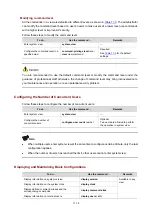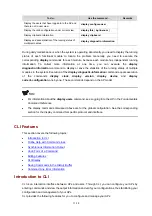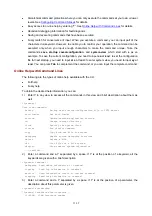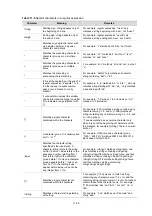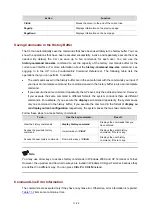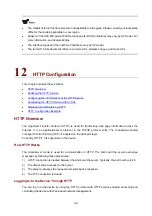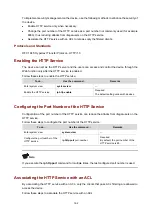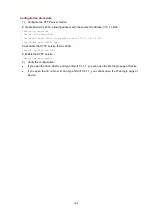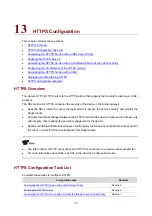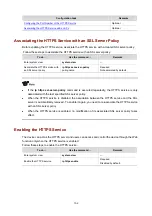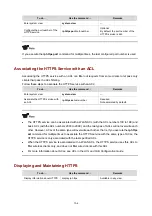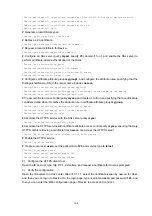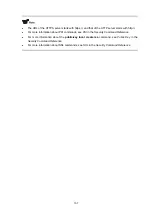
11-20
Table 11-5
Special characters in a regular expression
Character
Meaning
Remarks
^string
Starting sign.
string
appears only at
the beginning of a line.
For example, regular expression “^user” only
matches a string beginning with “user”, not “Auser”.
string$
Ending sign.
string
appears only at
the end of a line.
For example, regular expression "user$” only
matches a string ending with “user”, not “userA”.
.
Matches any single character, such
as a single character, a special
character, and a blank.
For example, “.l” matches both “vlan” and “mpls”.
*
Matches the preceding character or
character group zero or multiple
times.
For example, “zo*” matches “z” and “zoo”; “(zo)*”
matches “zo” and “zozo”.
+
Matches the preceding character or
character group one or multiple
times
For example, “zo+” matches “zo” and “zoo”, but not
“z”.
|
Matches the preceding or
succeeding character string
For example, “def|int” only matches a character
string containing “def” or “int”.
_
If it is at the beginning or the end of a
regular expression, it equals ^ or $.
In other cases, it equals comma,
space, round bracket, or curly
bracket.
For example, “a_b” matches “a b” or “a(b”; “_ab” only
matches a line starting with “ab”; “ab_” only matches
a line ending with “ab”.
-
It connects two values (the smaller
one before it and the bigger one after
it) to indicate a range together with
[ ].
For example, “1-9” means 1 to 9 (inclusive); “a-h”
means a to h (inclusive).
[ ]
Matches a single character
contained within the brackets.
For example, [16A] matches a string containing any
character among 1, 6, and A; [1-36A] matches a
string containing any character among 1, 2, 3, 6, and
A (- is a hyphen).
“]” can be matched as a common character only
when it is put at the beginning of characters within
the brackets, for example [ ]
string
]. There is no such
limit on “[”.
( )
A character group. It is usually used
with “+” or “*”.
For example, (123A) means a character group
“123A”; “408(12)+” matches 40812 or 408121212.
But it does not match 408.
\index
Matches the character string
specified by the index twice. A
character string refers to the string
within () before \.
index
refers to the
sequence number (starting from 1
from left to right) of the character
group before \. If only one character
group appears before \,
index
can
only be 1; if n character groups
appear before
index
,
index
can be
any integer from 1 to n.
For example, (
string
)\1 matches
string
twice, and
thus matches a string containing
stringstring.
(
string1
)(
string2
)\2 matches
string2 twice
, and thus
matches a string containing
string1string2string2.
(
string1
)(
string2
)\1\2 matches
string1string2
twice
,
and thus
matches a string containing
string1string2string1string2.
[^]
Matches a single character not
contained within the brackets.
For example, [^16A] means to match a string
containing any character except 1, 6 or A, and the
matching string can also contain 1, 6 or A, but cannot
contain these three characters only. For example,
[^16A] matches “abc” and “m16”, but not 1, 16, or
16A.
\<string
Matches a character string starting
with
string
.
For example, “\<do” matches word “domain” and
string “doa”.
Summary of Contents for WA Series
Page 10: ...v 15 Index 15 1...


